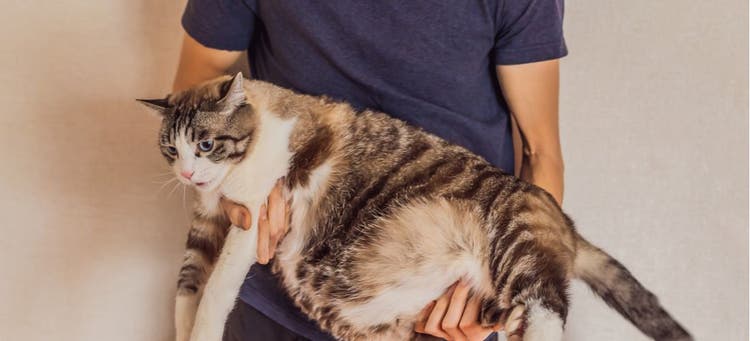
Is Your Cat Overweight?
Spoiling cats with food and treats is almost as fun for us as it is for them, but there’s such a thing as overindulging. Consistent snacking coupled with a sedentary lifestyle can turn spry kitties into sluggish adult cats by saddling them with excess pounds and health concerns.
If you occasionally over-feed your cat, don’t worry, you’re far from alone. The Association of Pet Obesity Prevention has found that a majority of pets (55.8% of dogs and 59.5% of cats) are at least overweight, with many far exceeding healthy weight standards. Obesity affects 18.9% of dogs and 33.8% of cats according to the organization’s 2018 survey data, making it the most-common preventable disease for both types of pets.
Is Your Cat Overweight?
While a veterinary examination is the best way to assess your cat’s weight and overall health, you may not need a scale or an expert education to determine whether they’re overweight or not. Follow these four steps to make a quick judgment:
- Run your hands along both sides of your cat’s abdomen. If you can’t easily feel their ribs below the surface, your cat may be overweight or obese.
- Observe your cat from the side. If they’re at a healthy weight, you should be able to discern their ribs and should not see any obvious excess fat. Keep in mind that your untrained eye may mistake a primordial pouch for an overweight feline belly. Learn to spot the difference with our guide to primordial pouches.
- Observe your cat from above or from the back. When cats are at a healthy weight, you should be able to see a visible narrowing at the waist. An overweight or obese cat may have protruding fat between their waist and ribs.
- Observe your cat from the front. Unless they’re overweight or obese, you should be able to make out an indentation between their hips and ribs. Heavier cats will not have this clear waistline.
It may be tough to make assessments with your eyes alone if your cat has an especially bushy coat. Uncertain cat owners should take their pets to the veterinarian to be weighed and undergo a thorough examination.
Health Risks for Obese and Overweight Cats
Excess weight can affect nearly every part of your cat’s body, reduce their standard of living, and even shorten their life. Here are more of the ways being overweight or obese can make an impact on your feline’s health.
- Carrying extra weight puts added pressure on a cat’s joints and ligaments, potentially affecting their mobility.
- An overweight cat’s heart must work harder to pump blood throughout the body. This can lead cats to develop high blood pressure.
- Obesity can cause cats to develop diabetes mellitus, a condition in which the body fails to produce adequate insulin.
- Cats face greater surgical risks when they’re obese or overweight. Layers of fat may impede a surgeon’s ability to target the necessary areas and obesity’s effect on the liver and kidneys may make it challenging for a cat’s body to metabolize anesthetic drugs.
- Overweight and obese cats may suffer from impaired immune systems. Weakened immune responses can mean an increased risk of developing dangerous or even fatal infections.
- Obese cats develop more urinary tract infections and bladder stones than healthier animals.
- Obesity increases the risk of developing certain types of cancer, as well as the potentially fatal liver disease known as hepatic lipidosis. Commonly referred to as “fatty liver disease,” hepatic lipidosis is most common liver disease among cats.
Talk to Your Vet
You don’t have to go it alone – and you probably shouldn’t try to. Sudden changes to your cat’s diet or exercise regimen can have unintended negative effects and potentially lead to conflicts between the two of you. If you suspect your cat could afford to drop a few pounds, talk to your veterinarian about changing your pet care routine for the better.